Humanities & Social Sciences
President Museveni underscores political & economic integration as permanent cure for Africa’s marginalization
Published
2 years agoon
By
Mak Editor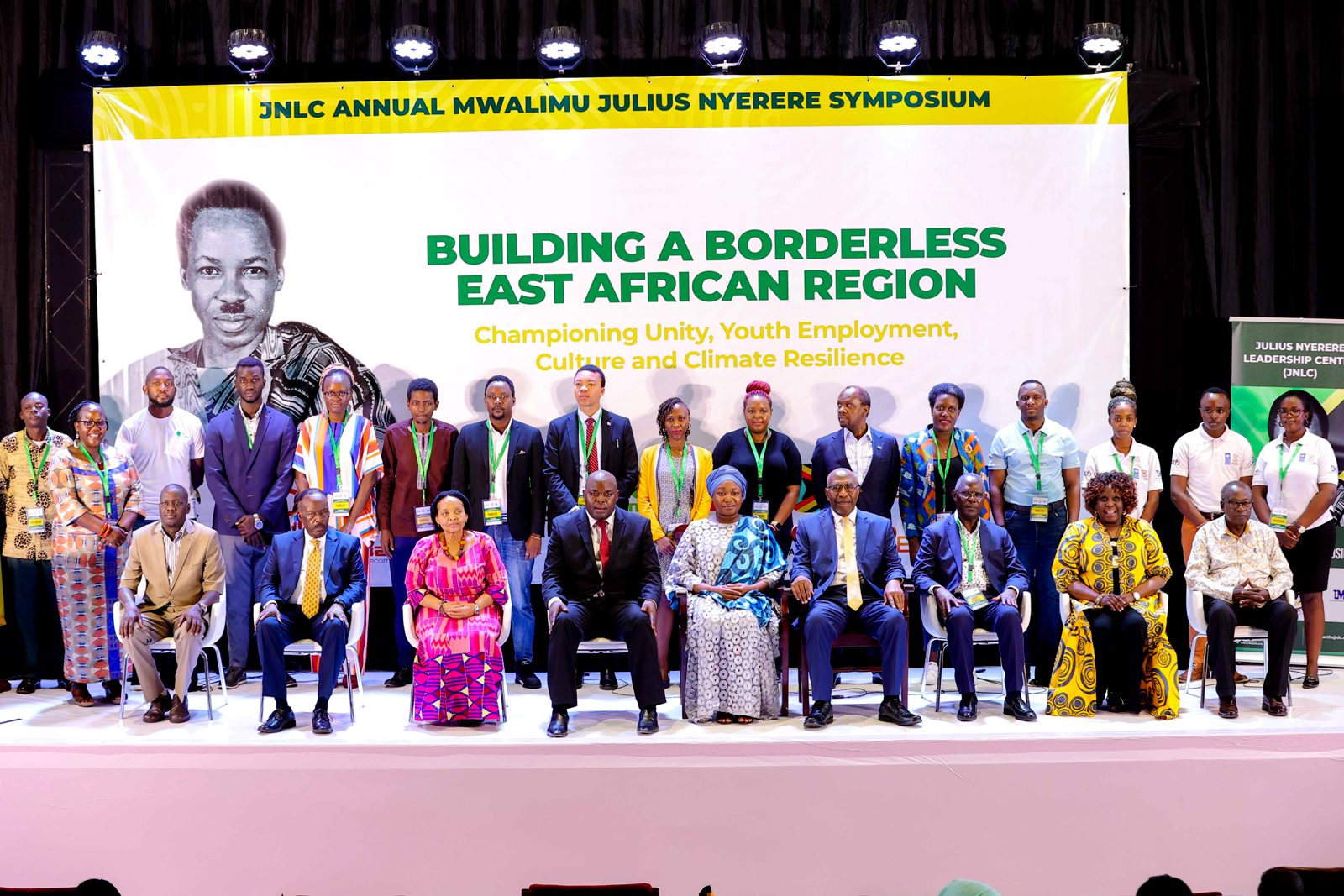
The President of the Republic of Uganda, His Excellency Yoweri Kaguta Museveni has emphasized the need for African countries to strengthen both political and economic integration as a permanent cure of Africa’s weaknesses and marginalization around the world. In a speech read by the former Prime Minister of Uganda, Rt. Hon. Dr. Ruhakana Rugunda on 14th October 2023 at the Annual Mwalimu Julius Nyerere Symposium, the President said that Africa must cure herself of the victim mentality and take the initiative of shaping her own destiny.
“We have an unprecedented advantage of a market of 1.3 billion people. This is a formidable treasure in our hands, it has the potential of not only making us richer, but also earning us respect in the world as a power to reckon with,” he noted.
Reflecting on the times when NRM captured power in 1986, President Museveni said that Uganda’s population by then was a paltry 15 million people and the East Africa Community which would have compensated for Uganda’s small market had been brought to its knees. He was however, happy that the NRM government did not waste time in working with Tanzania and Kenya to revive the East Africa Community. To him, the concerted efforts paid off in 1999 when the original members of Uganda, Kenya and Tanzania signed the treaty which re-established the East African Community. The community has since grown with the addition of Rwanda, Burundi, South Sudan, and the Democratic Republic of Congo.
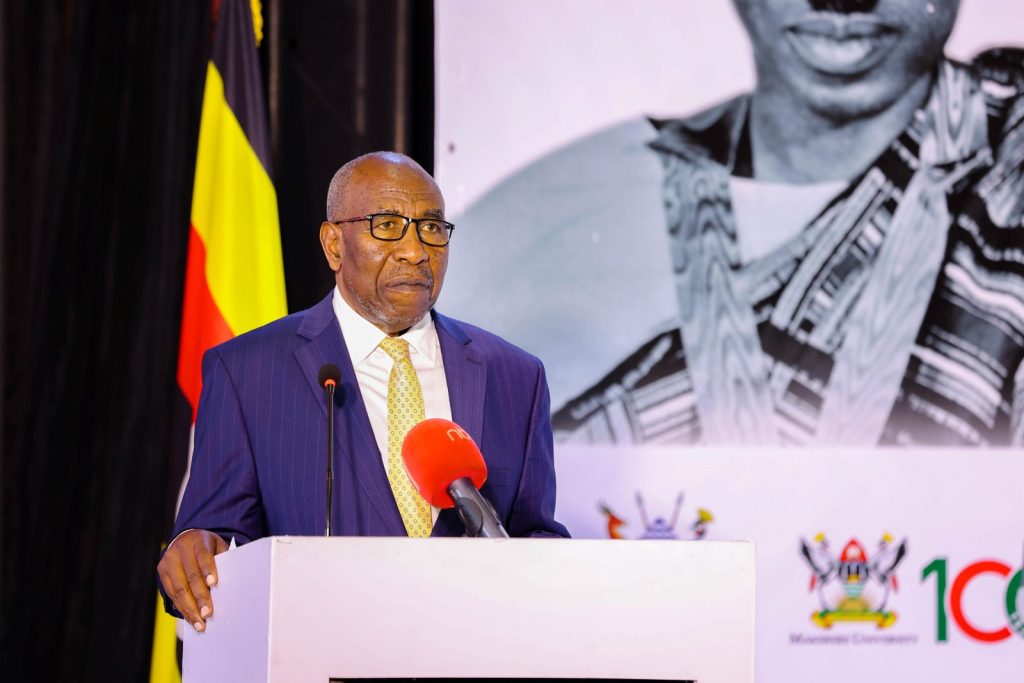
He acknowledged the regional blocks such as Economic Community of West African States (ECOWAS), Common Market for Eastern and Southern Africa (COMESA), East Africa Community (EAC) and the Southern African Development Community (SADC) for increasing the volume of trade among African countries. And with the signing and ratification by individual member states of the African Continental Free Trade Area (AfCFTA), the President was happy that Africa now boasts of the largest free trade area in the world.
“It must be remembered that Africa was forcefully integrated into the world economy as a source of cheap labour and raw materials for western industries. Africa has donated enough wealth to the rest of the world. It is time to cut off the proboscises of parasites, whose wealth has been sucked from our mines, soils, forests and lakes,” he said.
“Our chief interest should be on securing the survival and prosperity of our children and their children. There is no better guarantee for their future than working towards the political and economic integration of Africa. For the first time, we have the opportunity of safeguarding our great human and natural resources under the African supernatural government. The African leaders, therefore need to work hard so as not share the fate of the pre-colonial tribal chiefs that let down their people,” he added.
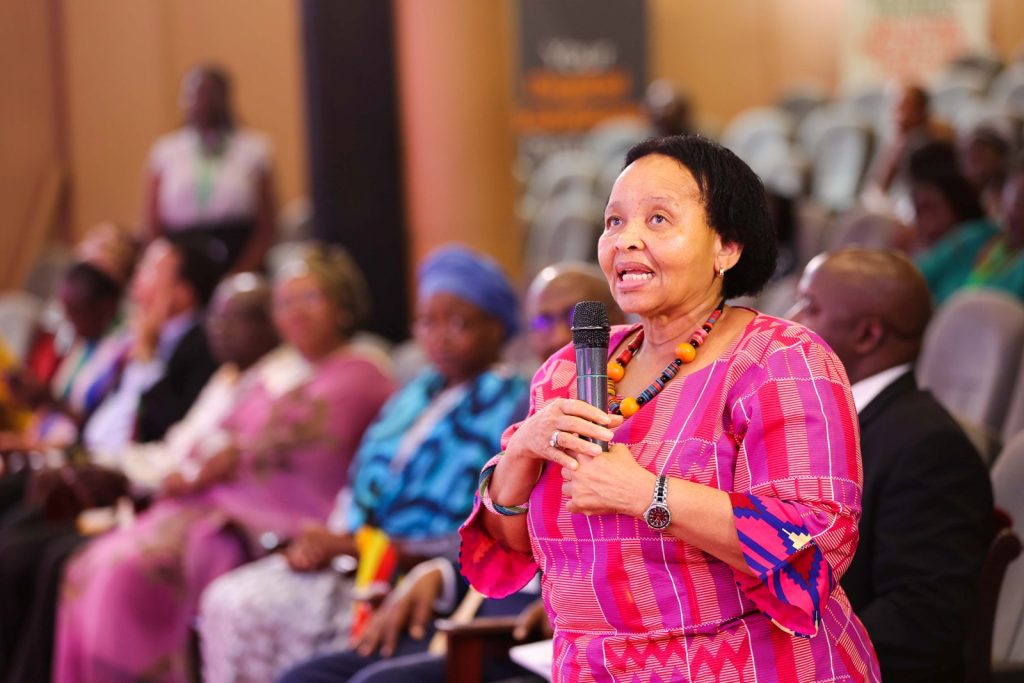
President Museveni saluted the contribution of Mwalimu Julius Nyerere to the liberation of Africa and urged young people to carry on Mwalimu’s vision of a strong and united Africa. To him, every year, he eagerly looks forward to this day, that was set aside to commemorate the life and legacy of Mwalimu Julius Nyerere. He was happy that Uganda joins Tanzania and the rest of the entire African continent to celebrate an African hero. “As we celebrate this day, it is important to remind ourselves of the unfinished work, which Mwalimu pioneered, and carry it forward to its logical conclusion. This will be the most befitting tribute to his great legacy,” he emphasized.
According to him, Mwalimu Nyerere was a true champion of African freedom and liberation. Mwalimu Nyerere unlike most of the African nationalist fighters, espoused the idea that attainment of independence, by the respective African countries, was not an end in itself. His true legacy lies in the fact that he, first and fore most supported liberation struggles to break the shackle colonialism and neo-colonialism, which had unfairly parceled the powers.
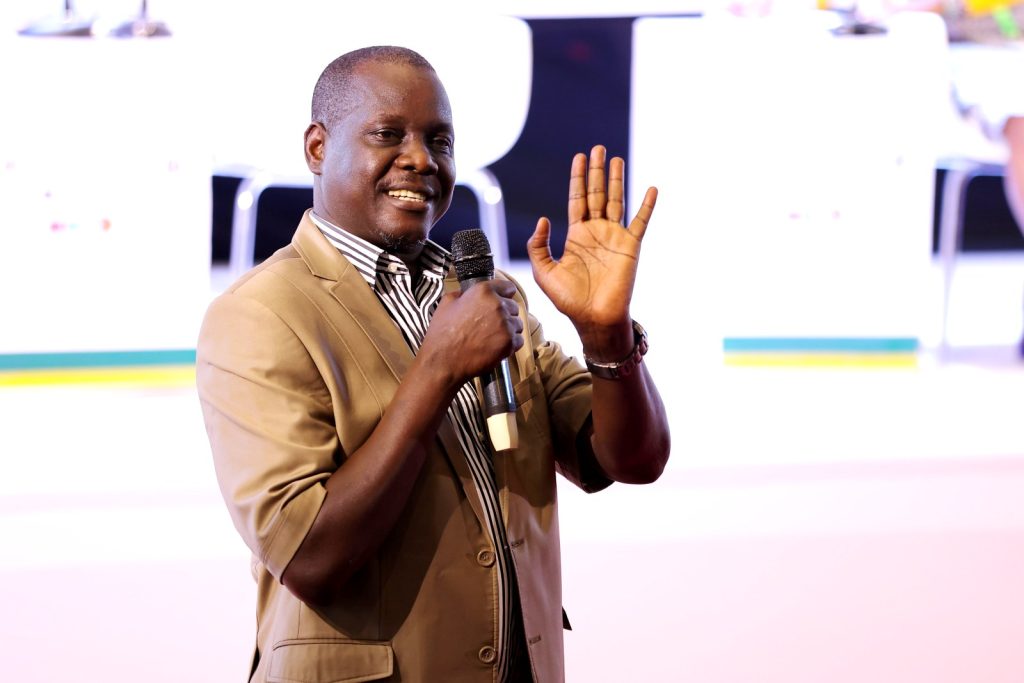
Additionally, Mwalimu Nyerere recognized the urgency of uniting the small independent African states to create for the first time Africa’s Centre of Gravity. He rejected the notion of arrivalism, which gripped the ruling elites once they took over the 53 colonies that the imperialists had organized for easy exploitation. “They imagined that they had arrived and the idea of Pan-Africanism was thrown out of the window. Mwalimu’s commitment to the goal of Pan-Africanism was demonstrated through the unification of Tanganyika and Zanzibar to create the United Republic of Tanzania. He was equally committed to the formation of the East Africa Federation,” said the President.
Every year the Julius Nyerere Leadership Centre in conjunction with its co-promoters, Makerere University and Uganda Management Institute organizes a symposium to honor and celebrate the legacy of Mwalimu Julius Kambarage Nyerere. The Annual Symposium which brings together students, academics, researchers, business people, experts and political thought leaders from across the African region provides a platform for them to reflect on how to regenerate and keep alive the powerful efforts of Mwalimu Julius Nyerere on Pan-Africanism.
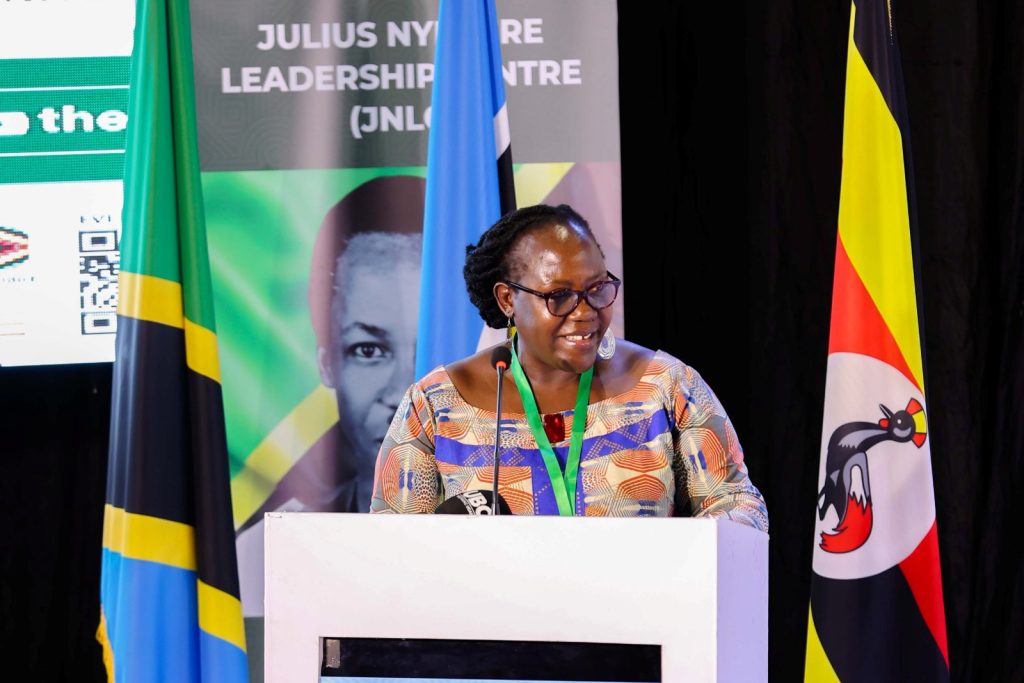
Representing the Makerere University Vice Chancellor Prof Barnabas Nawangwe, the Principal of the College of Humanities and Social Sciences Prof. Josephine Ahikire noted that the Mwalimu Julius Nyerere Annual Symposium provides a wider platform to deliberate and conduct powerful discussions on the challenges and opportunities faced by East Africa and Africa at large.
According to the Vice Chancellor, the Mwalimu Julius Nyerere Annual Symposium 2023 that was held on 13th – 14th October 2023 created space for participants to envision and interrogate the challenges, opportunities and strategies needed to foster collaborations and unity in pursuit of shared prosperity under the theme: Building a Borderless East Africa: Championing Unity, Youth Employment, culture and Climate Resilience.
The Chairperson, Board of Directors of the Julius Nyerere Leadership Centre (JNLC) Dr. Mulindwa Kasozi Saturninus also noted that the rich conversations were built on the success of the 2022 Nyerere @100 Symposium that put the youth at the fore front of the debates and proposals on development.
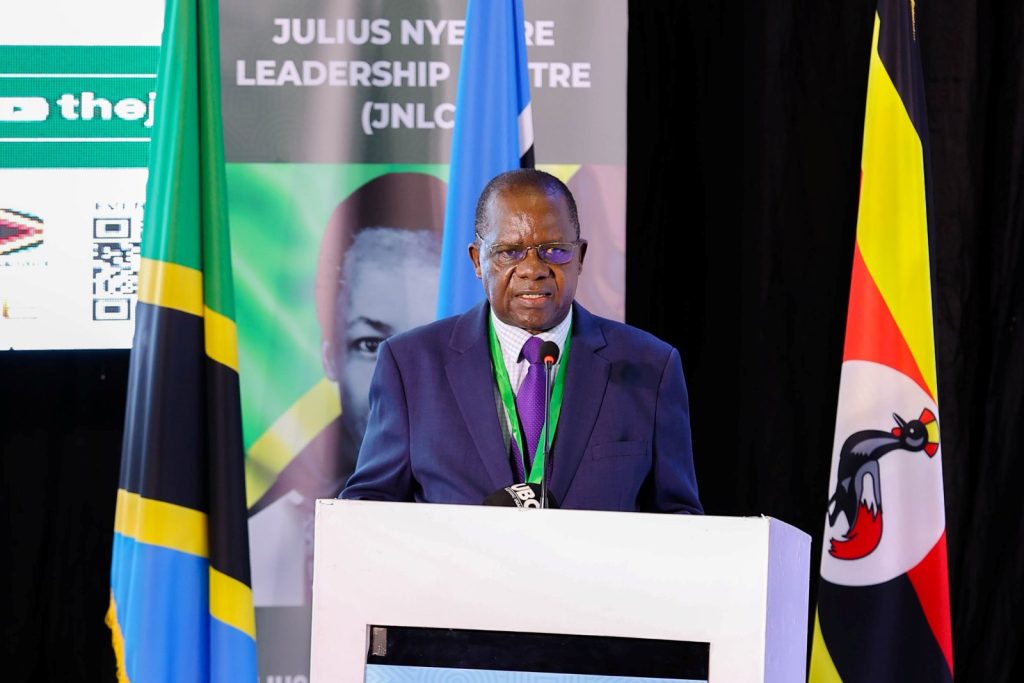
Ms. Stella Agara, a renowned governance and youth development specialist was the Keynote Speaker on the theme; Building a Borderless East Africa: Championing Unity, Youth Employment, culture and Climate Resilience. She reflected on some of the strong and memorable words of Mwalimu Julius Nyerere, “without Unity there is no future for Africa.” According to Ms. Stella Agara such words call for African countries to deepen and widen regional integration with a greater focus on prioritizing regional freedom of movement.
She questioned the essence of a borderless East Africa when some countries like Burundi and South Sudan still face hiking costs of Air tickets when accessing other countries within the region? She questioned the idea of a borderless East Africa when African nationals are still considered “aliens” in the respective African countries and students still face long process of residential identifications to access education within the region. Furthermore, it is still difficult for African nationals to acquire a residence or work permit in most of the African countries.
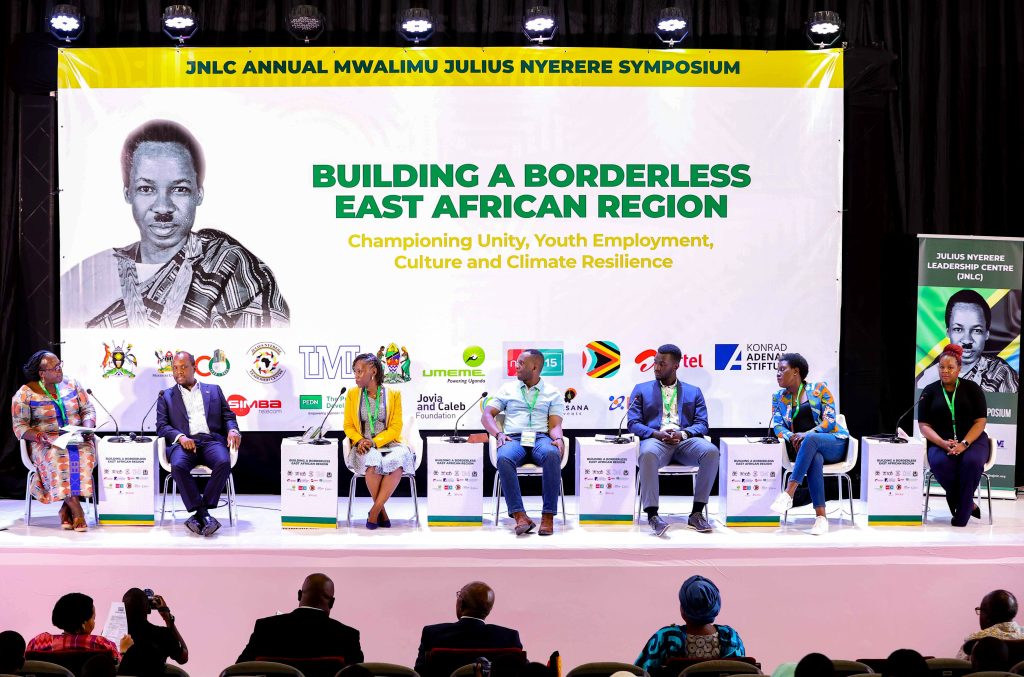
Ms. Stella Agara said that “the only way I am able to work in Tanzania is when I access a business permit at USD 100 and in the event I happen to fly out of the Tanzania before the expected exit date, I have to buy another one on return.”
She noted that traditionally, Africans were great at hosting strangers and it is this African culture of hospitality that our society demands today. She was puzzled by the fact that Africans can refer to fellow Africans as foreigners on the African land. To her, the sentiments that fellow Africans are flowing into different African countries as foreigners to take up jobs meant for nationals still stands with disbelief.
“As a region, we need to accept the fact that we need each other since each one of us is more endowed than the other in certain areas. We need to appreciate the fact that we are all members and citizens of this continent. We are citizens of the East African community and we cannot be foreigners on our soil. Young people now are more courageous about trips and taking opportunities across borders, therefore, there is much more room for integration,” she said.
Looking at some of the frameworks that have been put in place to foster a borderless Africa, Ms. Agara acknowledged the Revised Migration Policy Framework of the African Union and its Planning Action adopted in 2018. The Framework reflects on the migration dynamics in Africa and guides African Union member states and regional communities on the management of migrants. It further provides binding legal frameworks upon which member states link their migration policies to development needs and protection of migrants’ rights.
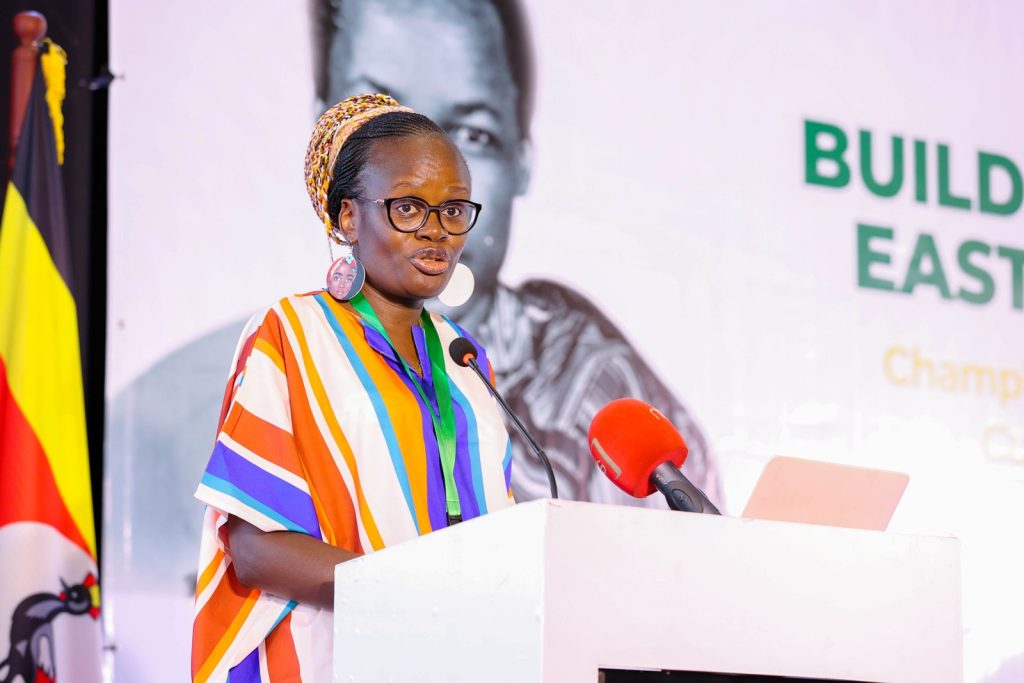
“This policy was however developed with a lot of thinking inclined towards addressing challenges of African young people who are dying on seas trying to access Europe. The AU has engaged in conversations to develop the African Continental Free Trade Agreement which speaks about the single passport, opportunities across borders, movement of services and goods and this brings quite great opportunities for managing migration but also collapsing our borders to create space,” she stressed.
She however highlighted the responsibility of the East Africa Community to cascade some of these policy frameworks and actions down to the East African Region noting that the East Africa Community has worked fast towards a Customs Union and common market protocol to create space and opportunities and making it easier for business carried across borders.
Ms. Agara called upon African countries to address extensively the issues of poverty and corruption that have created very strange differences when it comes to borderless movements within the region. In the same spirit, she urged them to break the barriers of strict cultures, behaviors and manners that create a rift to regional integration. She also encouraged African countries to appreciate the gendered face of borderlessness.
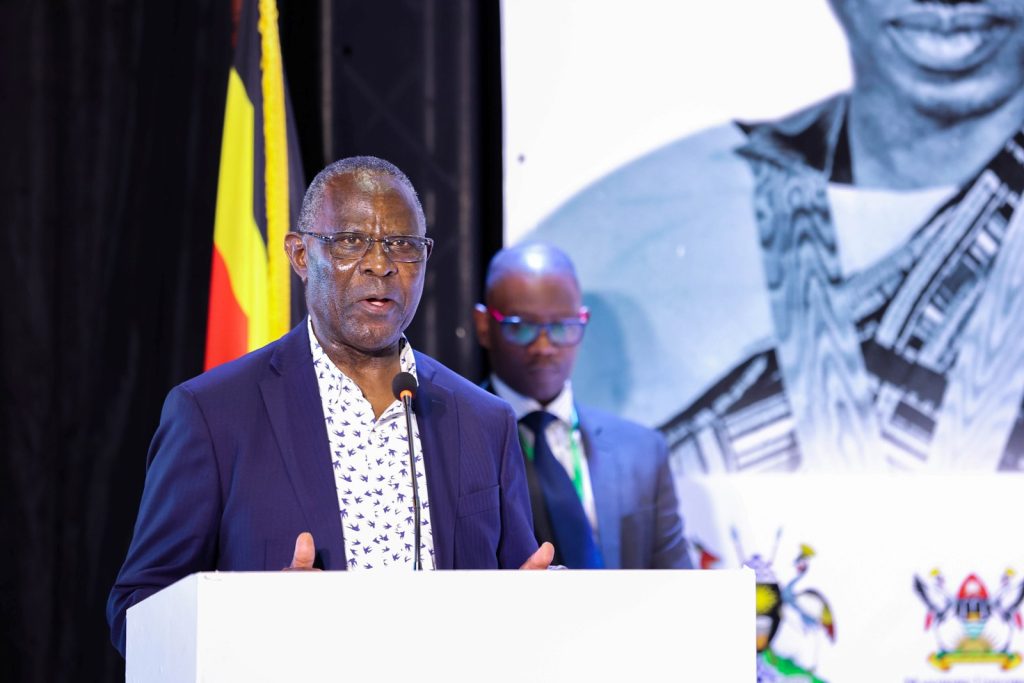
“Our borderlessness is going to promote conversations on climate change and also create opportunities to address the climate crises in solidarity. Young people today unlike our predecessors, have more international friends, spaces and people that they have not actually met by virtue of the fact that they control the digital space. This power from the youth can be harnessed for positive purposes or end up affecting how we view issues that we need to address today,” she said.
According to Ms. Agara, climate conversations are more narrative based and depend on who is controlling that narrative. Africa has done quite a lot of work and the leaders have actually developed a framework of how the Africa Union is going to approach the climate crisis. They have adopted the adaptation as the main mechanism through which countries should address the climate crisis and this is extremely important to the continent because it is being pushing towards resilience and tolerance.
“Africa has not contributed much to the carbon emission conversations, yet we are now being asked to stop mining oil, gold among other mineral resources and we are saying if we are to stop doing so, there is a conversation we must drive, it is impossible for us to engage in conversations without having addressed cross border relations,” she said.
The Keynote speaker called upon African countries to reflect on how they can replicate the Doom’s Day Seed Vault noting that the relevance of preserving African seeds on the African continent should be prioritized.
Mwalimu Julius Kambarage Nyerere
Julius Kambarage Nyerere was born on April 13th 1922 in Butiama on the eastern shores of Lake Victoria in North Western Tanganyika. His father was the chief of the small Zanaki tribe. He was 12 years before he started school (he had to walk 26 miles to Musoma to do so). Later he was transferred for his secondary education to Tabora Government Secondary School. His intelligence was quickly recognized by the Roman Catholic Fathers and with their support, he trained as a teacher at Makerere University in Kampala-Uganda. On gaining his certificate, he taught for three years and then went on a government scholarship to study history and political economy for his Masters of Arts at University of Edinburgh. He was the first Tanzanian to study at a British university.
In Edinburgh, partly through his encounter with Fabian thinking, Nyerere began to develop his particular vision of connecting socialism with African communal living. On his return to Tanganyika, Nyerere worked towards bringing a number of different nationalist factions into one grouping and he achieved this in 1954 with the formation of TANU (the Tanganyika Africa Union). He became the President of the Union and joined the Legislative Council in 1958. He became the Chief Minister in 1960. A year later Tanganyika was granted internal self-governance and Nyerere became Premier. Full independence was attained in December 1961 and he was elected President in 1962.
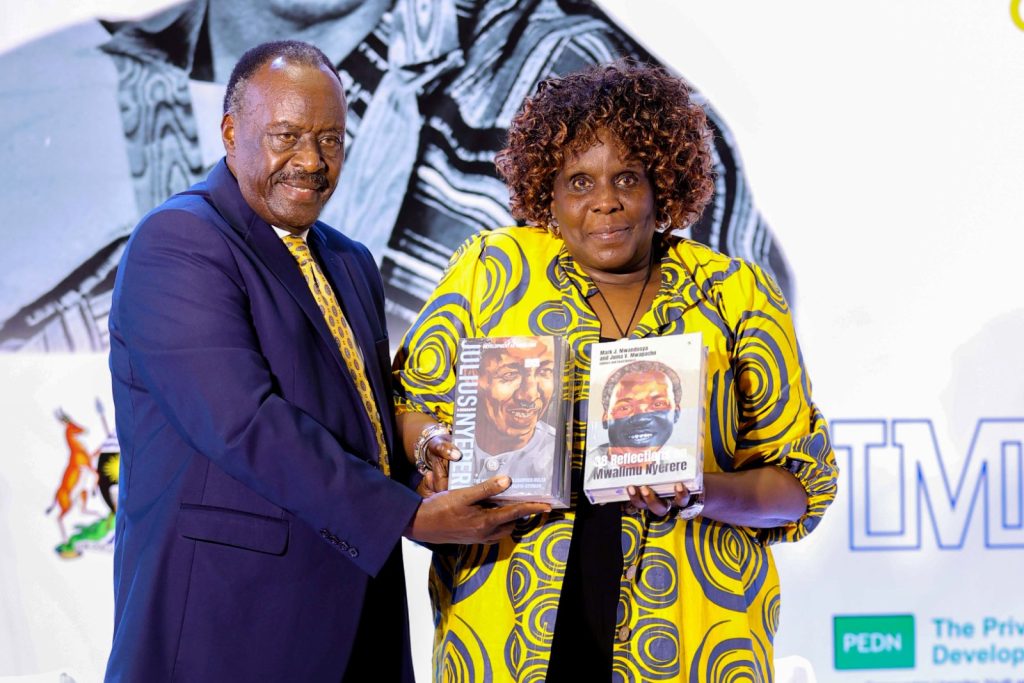
When paying tribute to his legacy Uganda’s High commissioner to the Republic of Tanzania H.E., Rtd. Col. Fred Mwesigye described Mwalimu Julius Nyerere as a civilized, considerate and courteous person. Mwalimu Nyerere was persuasive, kind and empathetic
“He was a teacher, who was able to simplify complex issues; a peacemaker and a peace builder. He had the capacity to persevere and he was a consensus builder. He appreciated different opinions and he was studious, he had enormous capacity to debate, he was a Pan-Africanist and yearned for a federated East Africa,” he said.
According to the acting High Commissioner of the United Republic of Tanzania to Uganda, H.E. Mr. Lucas Mayanga, the Charge d’Affairs, Mwalimu Nyerere’s idea of Pan-Africanism was gradual whereby he stressed the significance of nation building and regional integration before continental unity. To promote his idea, he was willing to delay the independence of Tanganyika in order to enable by then Tanganyika, Uganda and Kenya achieve their independence together as a single federal state.
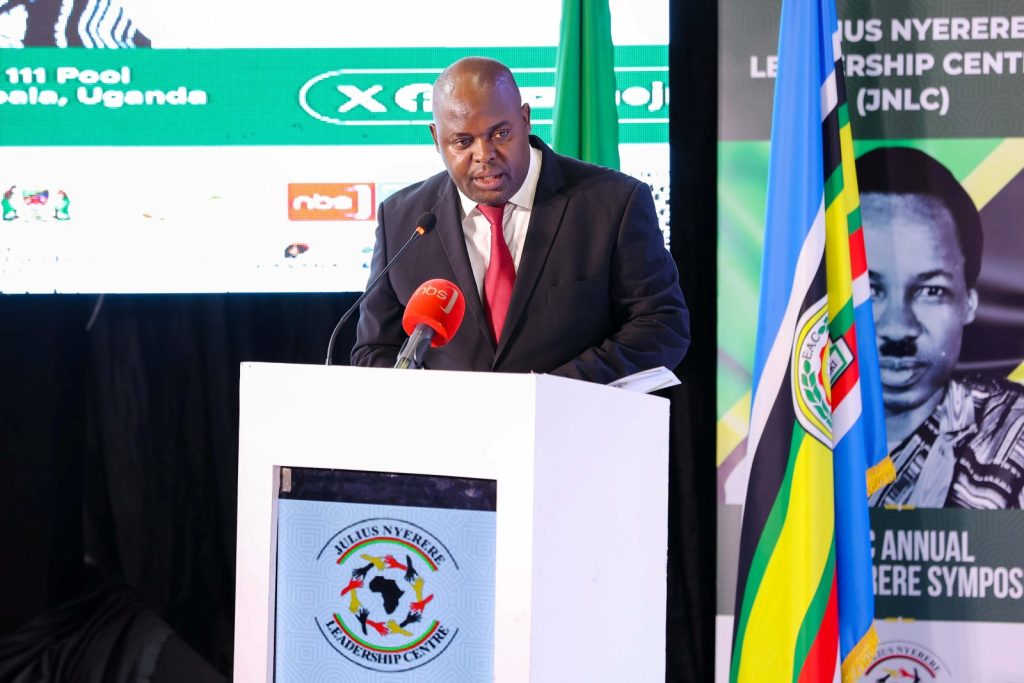
“While he fell short of realizing this vision, he united Tanganyika and Zanzibar to form the United Republic of Tanzania shortly after the independence of these two countries. This Union remains until today. It is in this regard that we welcome today’s Symposium theme of Building a Borderless East Africa Region,” the Commissioner stated.
The Julius Nyerere Leadership Centre (JNLC)
In 2018, the President of the Republic of Uganda advocated for and supported the establishment of the Julius Nyerere Leadership Centre as a Presidential Initiative. Hosted by Makerere University and Uganda Management Institute, the Centre is responsible for inter-generational dialogues on African history and study and conducting research on Africa revolutionary movements.
On October 6th 2018, President Museveni established the Julius Nyerere Leadership Centre (JNLC), at Makerere University, as a Presidential initiative. Co-promoted by Makerere University and Uganda Management Institute, the Centre was to provide leadership skills, training and mentorship to young people. Specifically, it was to conduct Leadership training of a new and emerging generation of African leaders; to foster Cross-generational dialogue and conversations on African history and revolutionary movements in order to align needs and plans for the future as one; and to conduct Policy leading Research that aspires to close that gap between academia and practical policies.
Dr. Nansozi K. Muwanga, the Executive Director of JNLC reveals that since it was established five years ago, the Centre has strived to fulfil these ambitious objectives and also to put students at the center of its activities as an important part of JNLC’s mission and vision.The Centre has thus provided trainings and mentorship sessions to young people on selfless leadership as part of historical and political perspectives of the African continent.
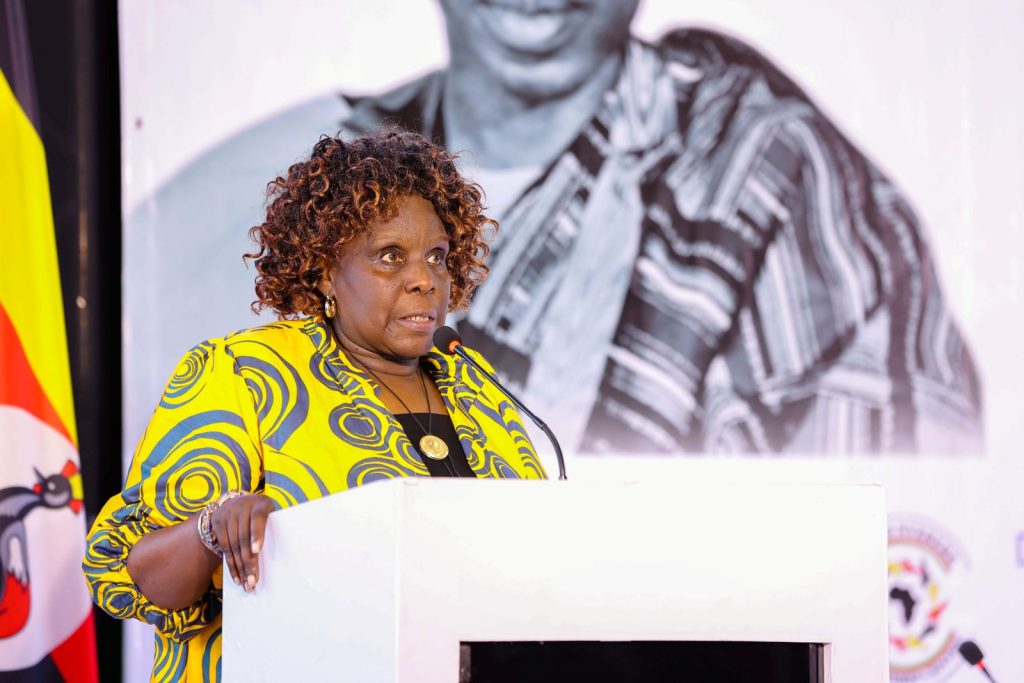
In addition to customized leadership training, the Centre also holds regular cross-generational fireside (Ekyooto) conversations on unity and Pan-Africanism as well as supporting student leaders to attend regional conferences, student debates on issues that affect them, national and regional development. To illustrate its commitment to Mwalimu Nyerere’s legacy and unity agenda, the Centre, with the support of the Language Department, has developed a Basic Kiswahili course to be implemented alongside its leadership training. Dr. Muwanga says that “these activities provide students with important eye-opening experiences, exposure and skills, which the recent drastic 80% budget cuts of the JNLC’s funding undermine. Muwanga says that these budget cuts notwithstanding the JNLC as a Presidential initiative has gained traction among students and Makerere University management. The JNLC’s leadership training has been endorsed by Makerere University Council that has made it mandatory for all those aspiring for leadership positions. Furthermore, “the Centre’s relevance is in ensuring it responds to students’ needs as it evolves to take into account emerging national and geopolitical issues whilst staying true to the legacy and aspirations of Mwalimu Nyerere.”
She acknowledged the support and contribution of long standing partners including the President of Uganda who is the Patron for his tremendous support towards the creation of the Centre; Makerere University and Uganda Management Institute for their steadfast financial and logistical support; the High Commission of the Republic of Tanzania to Uganda; Konrad Adenauer Stiftung (KAS); NBS and Afro Mobile; Simba Telecom; United Nations Development Programme; the Tanzania Community in Uganda; the Private Education Development Network; Future Generation Trust; aBi Development among others.
In the same spirit, she appreciated the Board of Directors of the Julius Nyerere Leadership Centre chaired by Dr. Kasozi Mulindwa for the invaluable support and constructive guidance. “To the staff of Julius Nyerere Leadership Centre, I thank you very much for your hard work and your consistent and committed efforts.”
Article by: Mak Public Relations Office and JNLC
You may like
-


Makerere Launches Scholarly Guide, Calls for Increased Research, Publication and Innovation in Africa
-
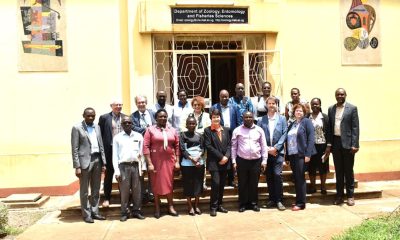

BOKU University Charts New Collaboration Strategies with Mak’s Department of Zoology, Entomology & Fisheries Sciences
-


When Birth Becomes the Most Dangerous Moment, Wanduru & the Work of Making Labour Safer
-
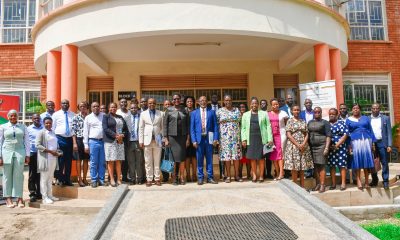

VC Opens Training for MoKCC Officials on Safeguards in Procurement
-


Study Alert: Power in Her Hands; Why Self-Injectable Contraception May Be a Game Changer for Women’s Agency in Uganda
-
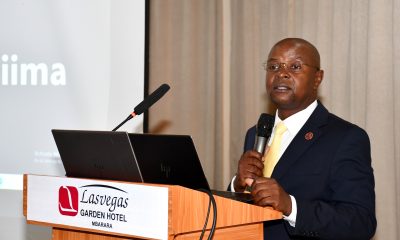

Building Skills for Better Public Investments: PIM Centre Trains Public Sector Economists
Humanities & Social Sciences
Dr. Pamela Khanakwa Honored for Steering Record 18 PhD Candidates for the Mak 2026 Graduation
Published
3 weeks agoon
January 23, 2026By
Jane Anyango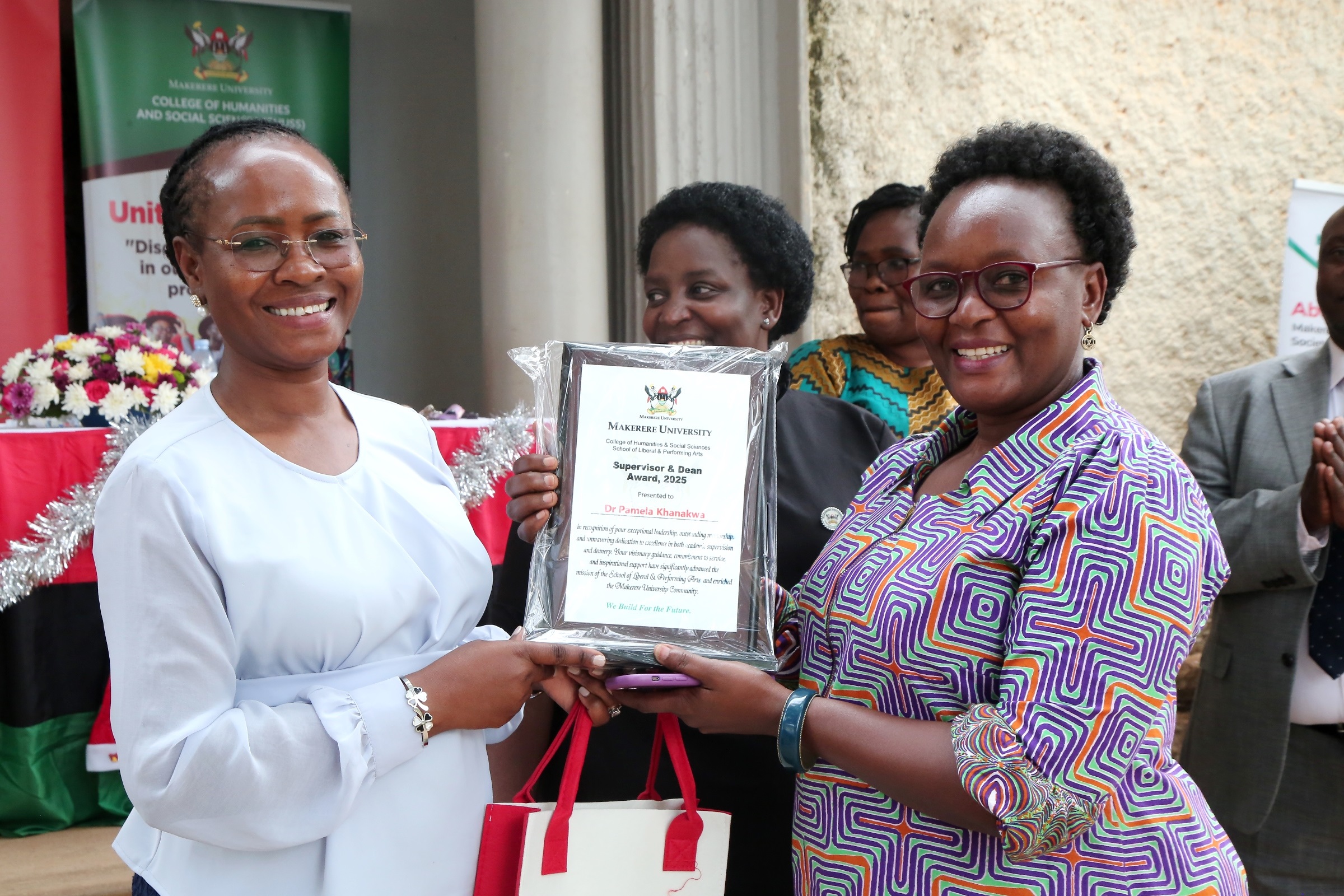
Six personally supervised, three completed in record time, as School of Liberal and Performing Arts sets a historic milestone. Dr. Pamela Khanakwa got the Award as Best PhD Supervisor and Dean
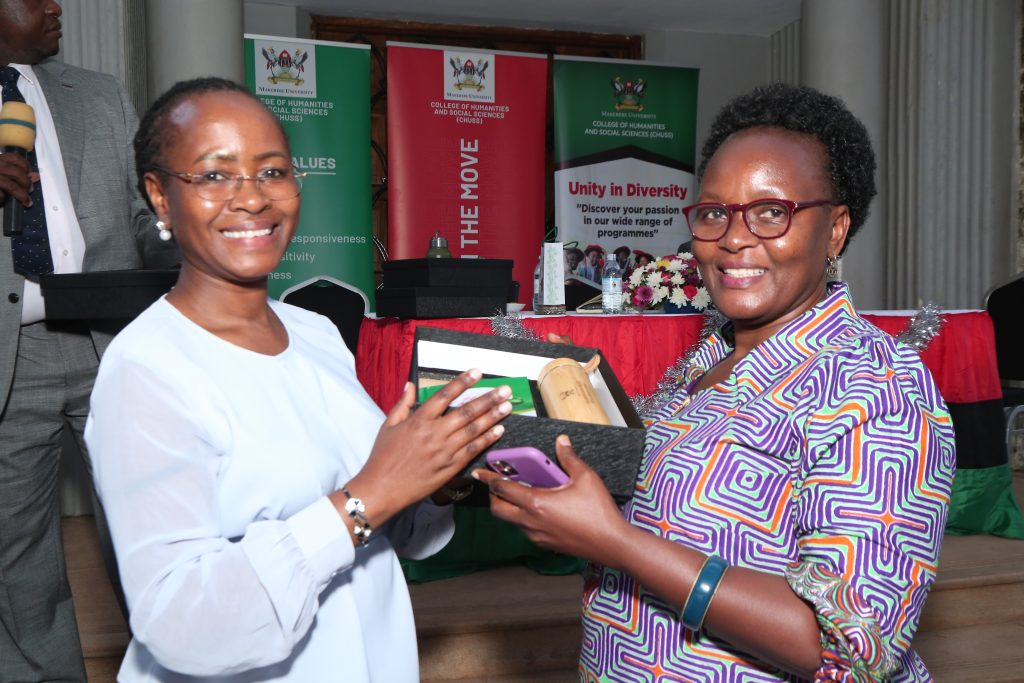
A Historic Academic Milestone for SLPA
The College of Humanities and Social Sciences (CHUSS) recognised the Dean of the School of Liberal and Performing Arts (SLPA), Dr. Pamela Khanakwa, for outstanding academic leadership that has seen the School field 18 PhD candidates for the next 2026 Makerere University Graduation Ceremony scheduled for 24th-27th February. Remarkably, six of these doctoral graduates were directly supervised by Dr. Khanakwa, with three completing within the official three-year timeframe, an exceptional achievement in graduate training. The recognition was announced during the CHUSS End-of-Year Get-Together, where staff applauded Dr. Khanakwa’s dedication, humility, and relentless commitment to postgraduate supervision and timely completion.
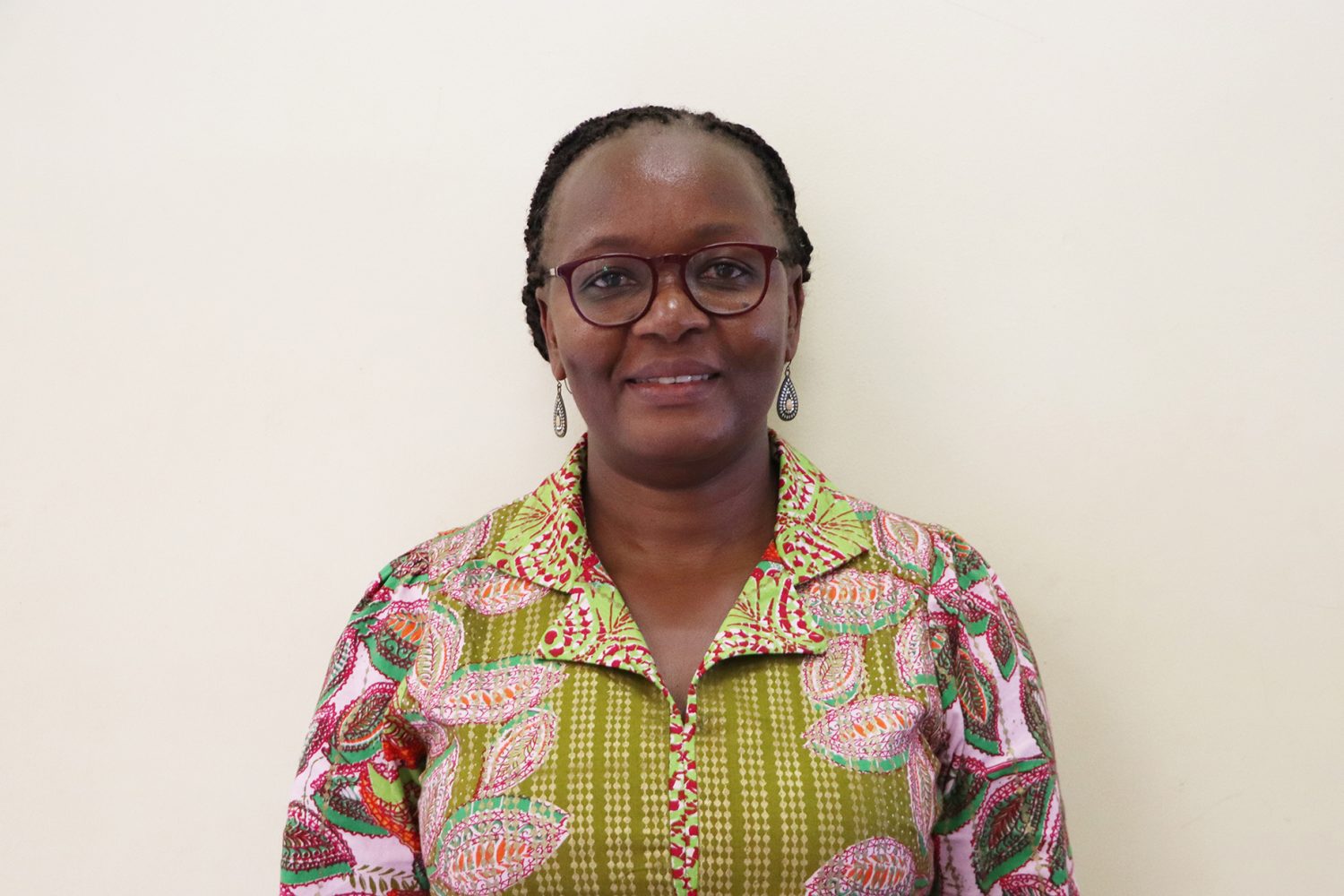
Message to Academic Staff
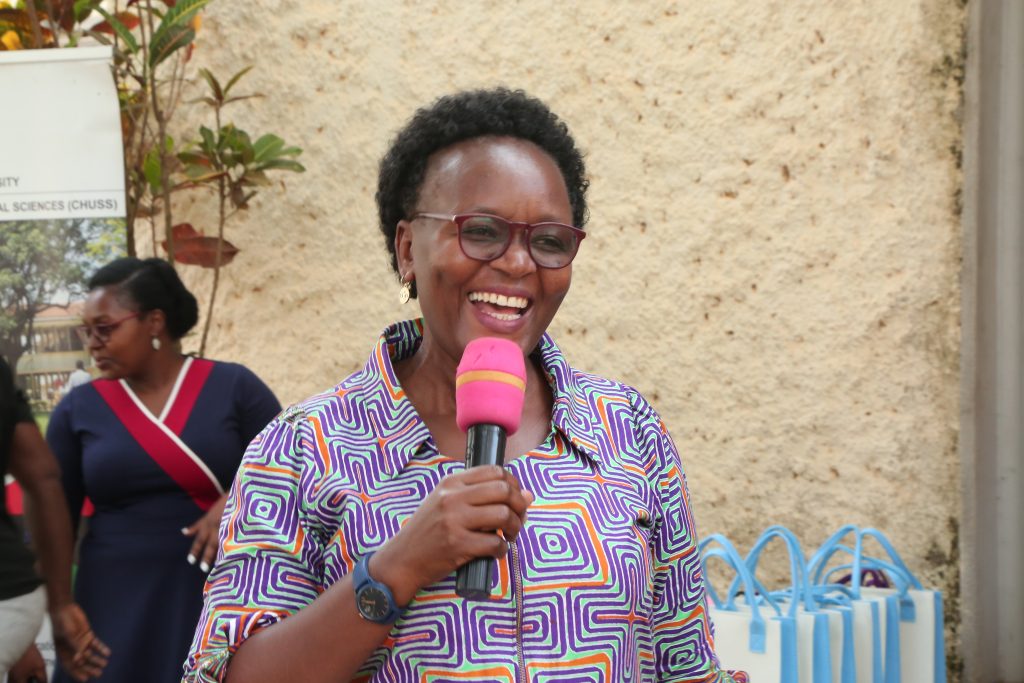
Q: What message do you have for your staff following this achievement?
Dr. Khanakwa:
First, I celebrate my staff and thank them for their dedication to supervision and student support. Academic work is demanding, and material rewards are often limited, but the true satisfaction comes from seeing students succeed.
I encourage my colleagues to remain committed. Yes, the workload is heavy, but many things are possible with dedication and teamwork. Let us continue working for the good of our students, our School, and Makerere University.
Leadership Rooted in Humility
Q: Many colleagues describe you as humble, down to earth, and hardworking. What shapes this character?
Dr. Khanakwa:
I think it is largely my upbringing. My mother was a primary school teacher from the 1950s until the mid-1980s. She worked extremely hard to raise us, combining teaching with farming to ensure we had school fees and basic needs. From her, I learned humility, discipline, and the value of hard work.
I also learned that leadership positions are temporary. You occupy them today, and tomorrow you move on. So humility is essential.
My graduate training also shaped me significantly. My PhD supervisor emphasized that graduate study is a full-time job and that results matter more than noise. Let people see your work through outcomes, not announcements.
Supervision as a Two-Way Commitment
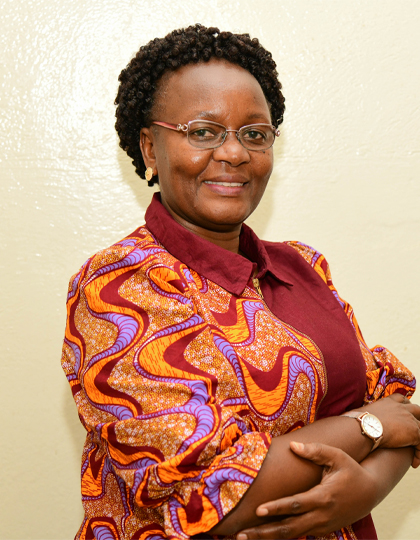
Q: How would you describe your supervision style?
Dr. Khanakwa:
I read my students’ work thoroughly, word by word. Sometimes my comments are tough, but they are honest. Supervision is a two-way commitment. I give feedback, but students must also respond and remain engaged. When that relationship works, progress happens.
Balancing Leadership, Scholarship, and Family
Q: How do you balance being a Dean, scholar, wife, mother, and daughter?
Dr. Khanakwa:
Honestly, I am not sure I balance perfectly. My mother lives far away in Bukwo, so visiting requires careful planning. My children grew up understanding the demands of academic life. I pursued my PhD in the United States and spent long periods away, but we adapted as a family.
Work has become part of my lifestyle. I use weekends to read dissertations, review manuscripts, and write. Sometimes my children ask if I ever sit without working, but this is the commitment I made. As we often say jokingly, “We humbly applied for the job, so let us do the job.”
Scholarship Beyond Supervision
Dr. Khanakwa is also an active scholar and editor. In the past year alone, she has:
- Edited scholarly volumes on archives, memory, method, and pedagogy
- Published a book with Routledge Companion
- Co-authored journal articles and book chapters with graduating students, including Priscah Asiimwe and Anatoli Lwasa Mpijja
“I feel an obligation to write with students,” she notes. “It takes time, energy, and commitment, but it is part of academic mentorship.”
Who Is Dr. Pamela Khanakwa?
Dr. Pamela Khanakwa is the Dean, School of Liberal and Performing Arts, College of Humanities and Social Sciences, Makerere University. She is a seasoned scholar, supervisor, administrator, and mentor whose leadership continues to redefine graduate training excellence. Details about Dr. Pamela Khanakwa can be accessed at: https://chuss.mak.ac.ug/en/personnel/pamela-khanakwa/
More details are available in her attached curriculum vitae.
The CHUSS End- Of-Year-Get-Together
On 12th December, 2025 the college leadership organised a get-together end of year gathering to take stock of the achievements, challenges and brainstorm together on how to move forward. The event was marked by entertainment, team building games, appreciation speeches, sharing a meal and a Christmas package for every staff
Retirees and staff recognised
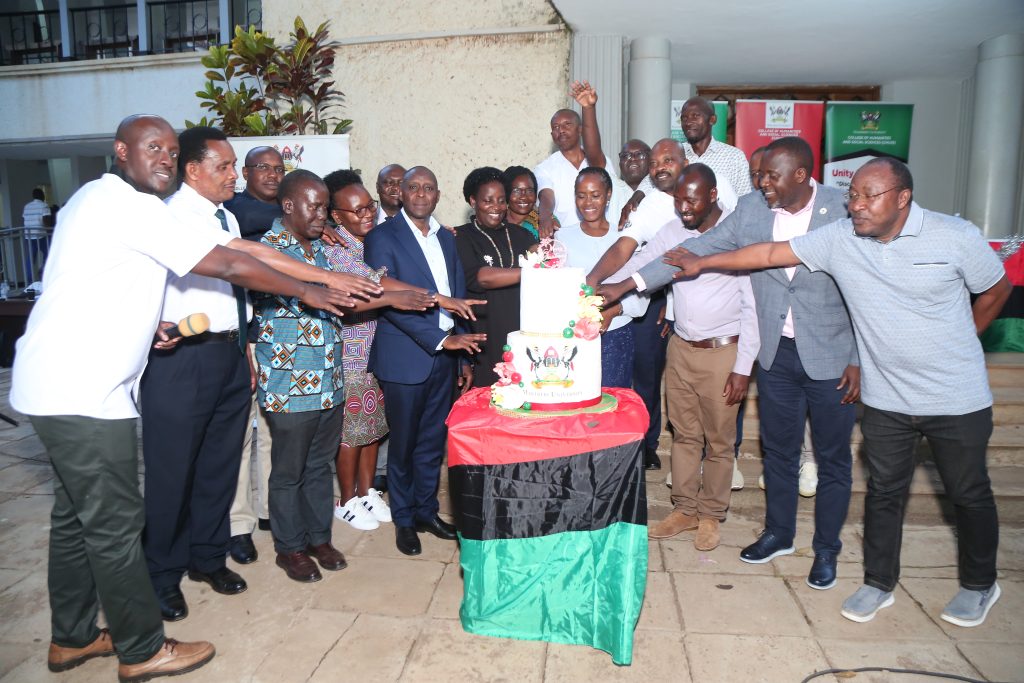
Five retired staff Dr. Micheal Wangotta Masakala, Dr. Anatole Kirigwajjo and Dr. Jackson Kizza Mukas (all from the School of Languages, Literature and Communication), Assoc. Prof. Florence Nansubuga (School of Psychology), Dr. Tusabe Gervase (School of Liberal and Perforing Arts) and Ms. Scovia Nganda Sekweyama (secretary from the School of Social Sciences) were recognised for their dedicated services to the university.
In addition to Dr. Pamela Khanakwa’s Award as Best PhD Supervisor and Dean, Ms. Birabwa Florence scooped the award of Best Registrar of the year. Birabwa is the registrar for the School of Liberal and Performing Arts.
Administrative and support staff including Ms. Mary Gyezaho and Annet Kashumbusha(both administrative secretaries in the Principals office), Farouq Lule (IT Officer), Godfrey Kakooza (cleaner), Charles Sebuguzi (driver) and Jane Anyango (Communications officer) were recognise with awards for outstanding service. Dr. Mohamed Mayanja Kajumba was from the School of Pyschology was recognised as the person with an outstanding talent in Handwriting.
The celebrations held in the Arts quadrangle were graced by the Vice Chancellor Academic Affairs Prof. Sarah Ssali and the Deputy Vice Chancellor in charge of Finance and Adminstration Prof. Ireeta Tumps.
Humanities & Social Sciences
Ugandan Journalists Trained on Peace and Gender-Sensitive Reporting Ahead of 2026 Elections
Published
1 month agoon
January 9, 2026By
Jane Anyango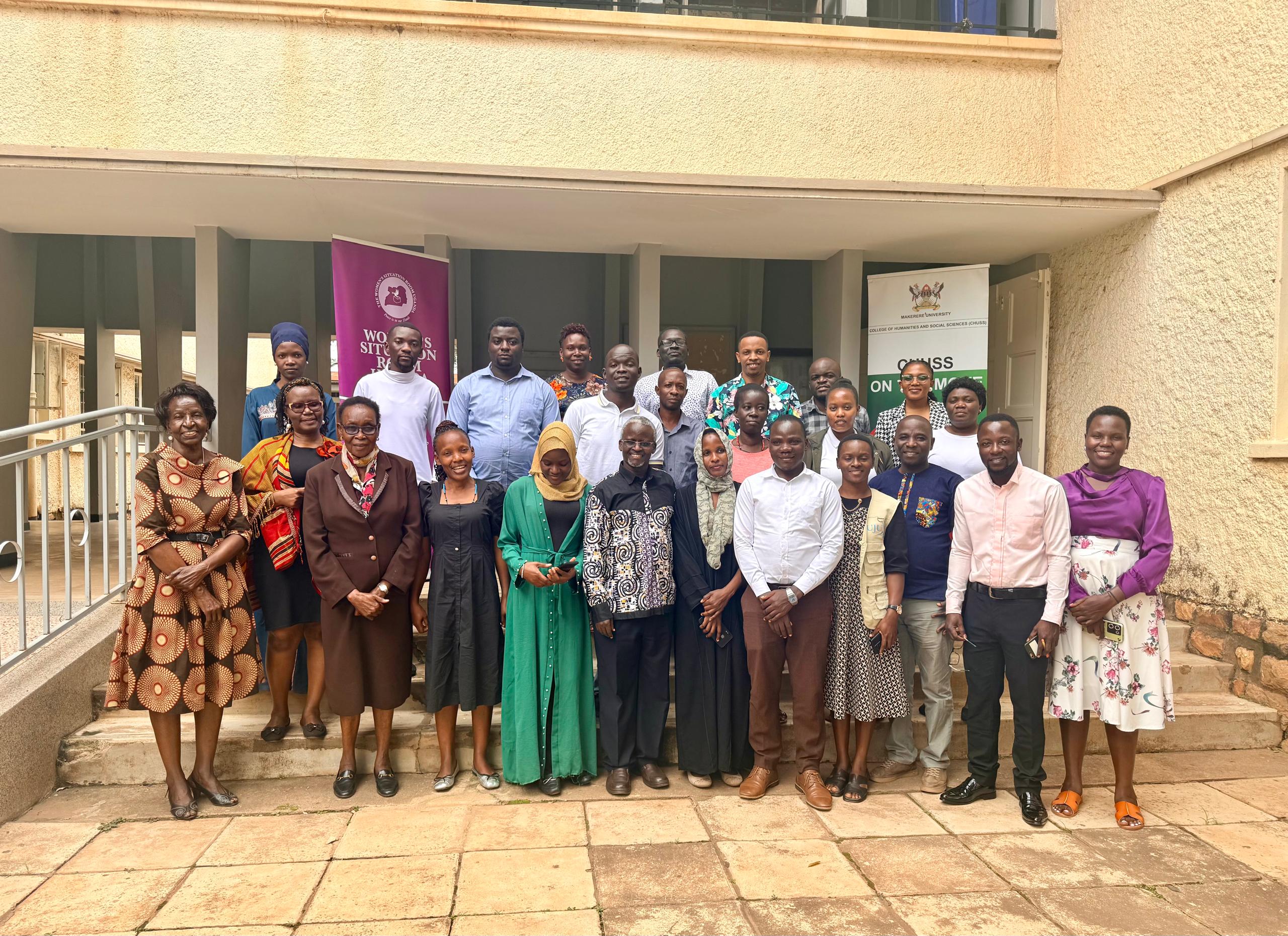
Kampala, Uganda – January 9, 2026
Ahead of the January 15 general elections, Ugandan journalists have undergone specialized training on peace and gender-sensitive reporting to ensure responsible media coverage during the election period. The two-day training, held from 8th to 9th January 2026 at Makerere University’s College of Humanities and Social Sciences Smart Room, was organized by the Women’s Situation Room (WSR) in partnership with various stakeholders and brought together journalists from across print, broadcast, and online platforms.
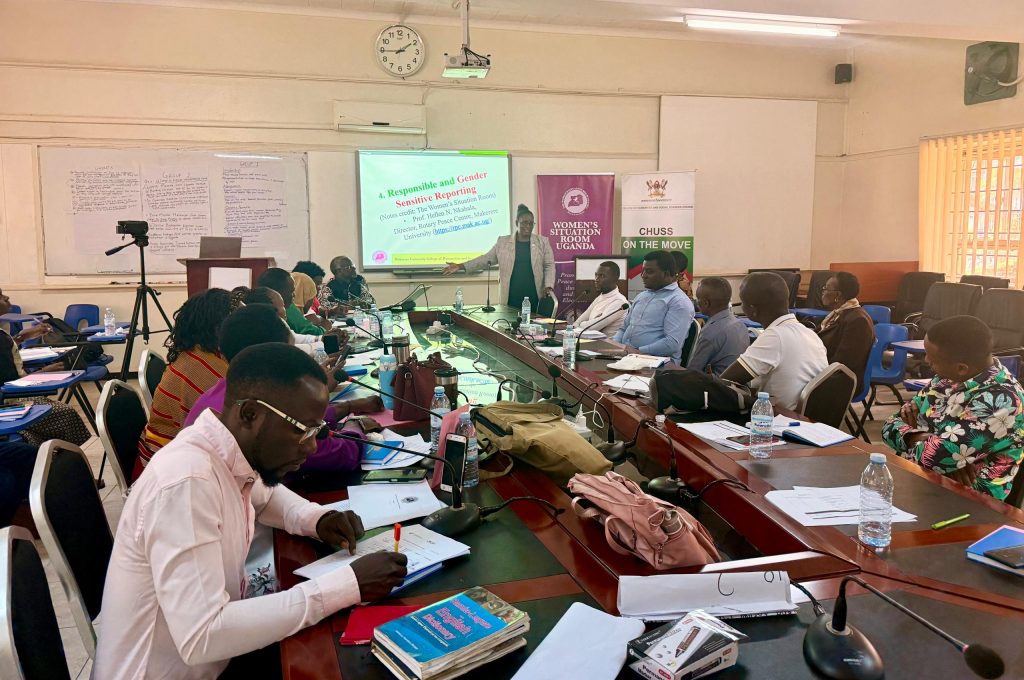
The main objective of the training was to strengthen the capacities of media in reporting and documenting electoral processes in a responsible and gender-sensitive manner. The specific objectives included: strengthening journalists’ skills to cover the 2026 elections in a fair, balanced, gender-sensitive, and non-violent partisan way; enhancing the role of media to enable citizens to be well-informed and actively participate in the election process; ensuring focused and balanced reporting on peace during and after elections; and strengthening partnerships between the WSR and media houses during the election period.
The training covered multiple critical modules. Day one focused on responsible conflict-sensitive reporting, emphasizing principles such as balance, impartiality, and accuracy. Participants explored the role of media as a relayer of the population’s voice, election monitor, catalyst for social cohesion and reconciliation, contributor to the accountability of political actors, and a platform for detecting and debunking digital media misinformation and hate speech.
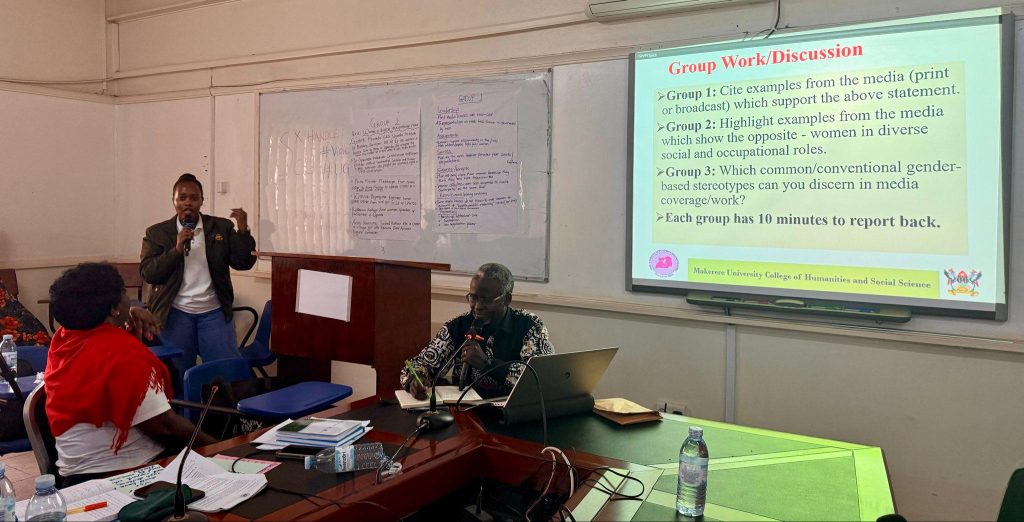
Day two addressed responsible and gender-sensitive reporting. Key aspects included the definition of gender-sensitive reporting, how to become a gender-sensitive reporter, critical elements in reporting with gender awareness, packaging gender-sensitive stories, and a checklist for detecting and avoiding gender-insensitive reporting.
Her Lordship, retired Judge Justice Mary Mayitum, emphasized the importance of peace as the foundation of development and democratic engagement. “Because we value peace more than anything. Without peace, really, you can do nothing. But where there is peace, you can have time to reflect, discuss with others, and join in meaningful dialogue,” she said. She warned that the country’s past conflicts, such as those in Gulu, underscored the necessity of maintaining national harmony.
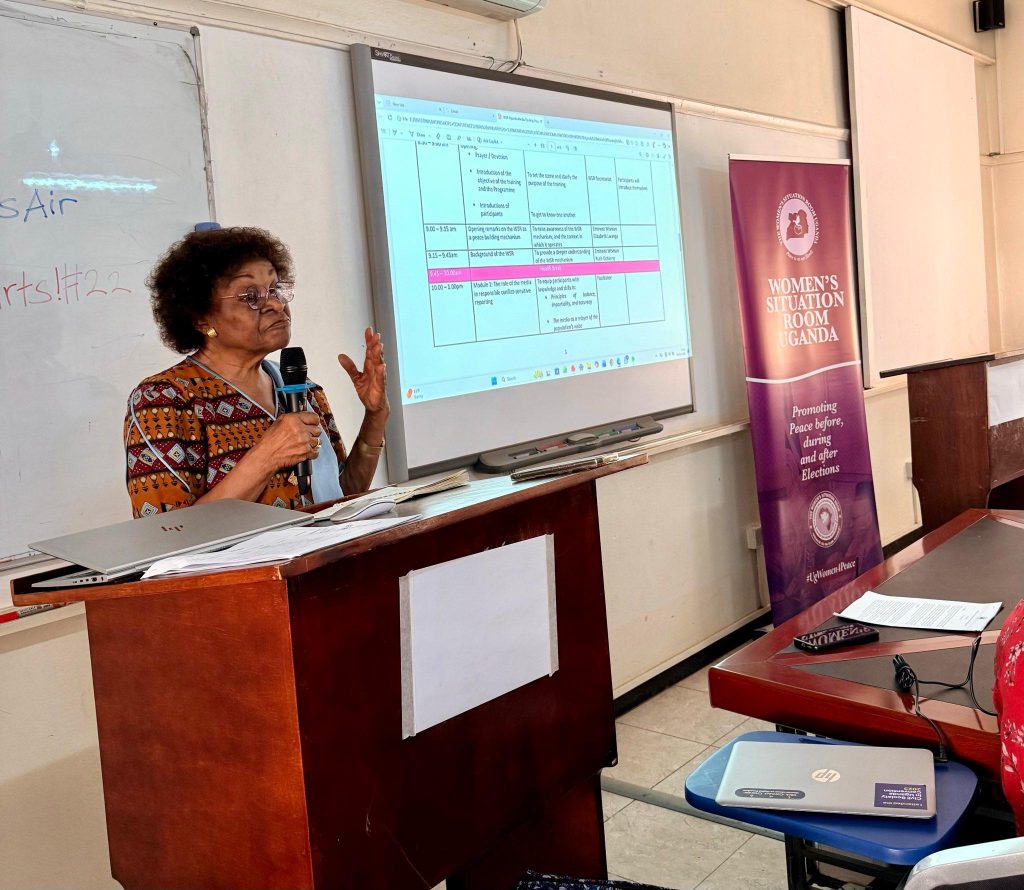
Justice Mayitum also urged other key election stakeholders to uphold peaceful conduct. “Being peaceful is the very heart of life. We have spoken to police, security personnel, political parties, and the Electoral Commission. We want politicians to have a code of conduct and to understand that it’s okay to think differently without fighting or hating one another,” she added.
Dr. William Tayebwa, lead facilitator and senior lecturer in the Department of Journalism and Communication at Makerere University, said, “This training is about conflict-sensitive reporting, peace journalism, and gender-sensitive reporting in the context of the elections. The emphasis was on giving female political candidates a voice while ensuring journalists report responsibly on election-related matters.”
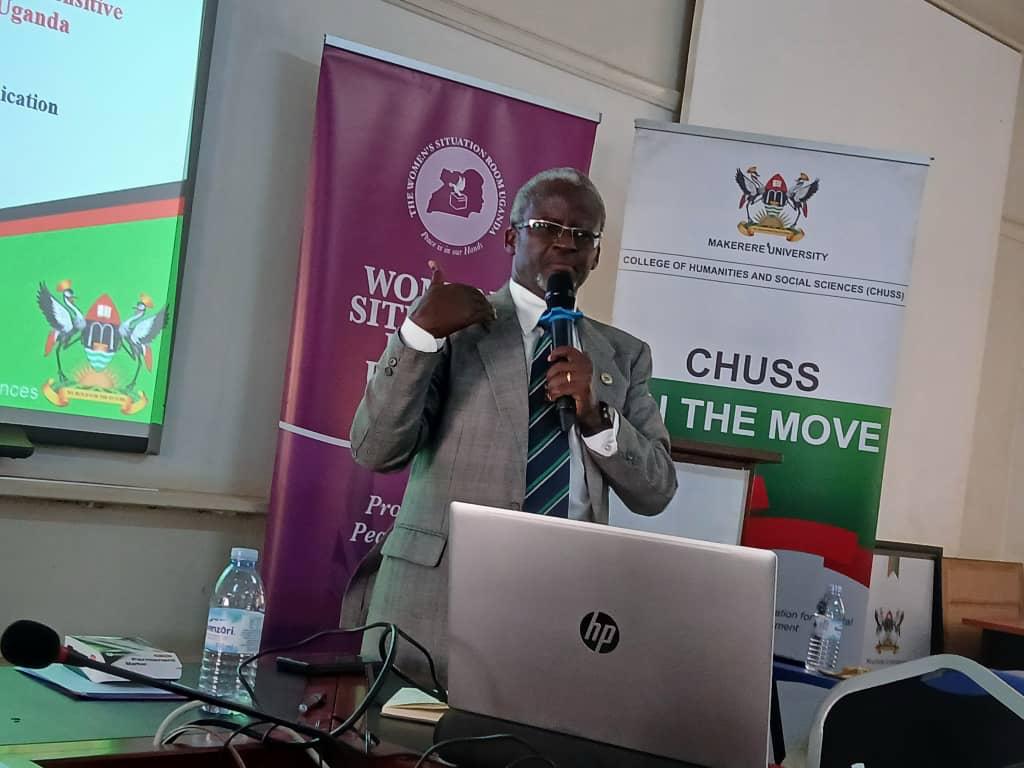
Participants described the training as timely and impactful. Tony Banizengabo of CBS Wakiso District said, “We’ve benefited a lot. We’ve been trained to write stories which bring peace, not conflict. Ahead of the elections, we are very ready to be part of peacemakers.”
Dorcas Kimono of UBC TV Kampala added, “It was so timely and rich. We learned how to report without promoting or fueling violence, giving voice to victims without angering them or encouraging violators. This is very vital, especially as we approach the 2026 elections.”
The training aims to equip media personnel with the knowledge and skills to uphold professional ethics while contributing to a peaceful, inclusive, and gender-sensitive electoral process.
Humanities & Social Sciences
CHUSS Invests Over UGX 100 Million in Interactive Smart Screens, Upgrades Teaching Infrastructure
Published
1 month agoon
January 9, 2026By
Jane Anyango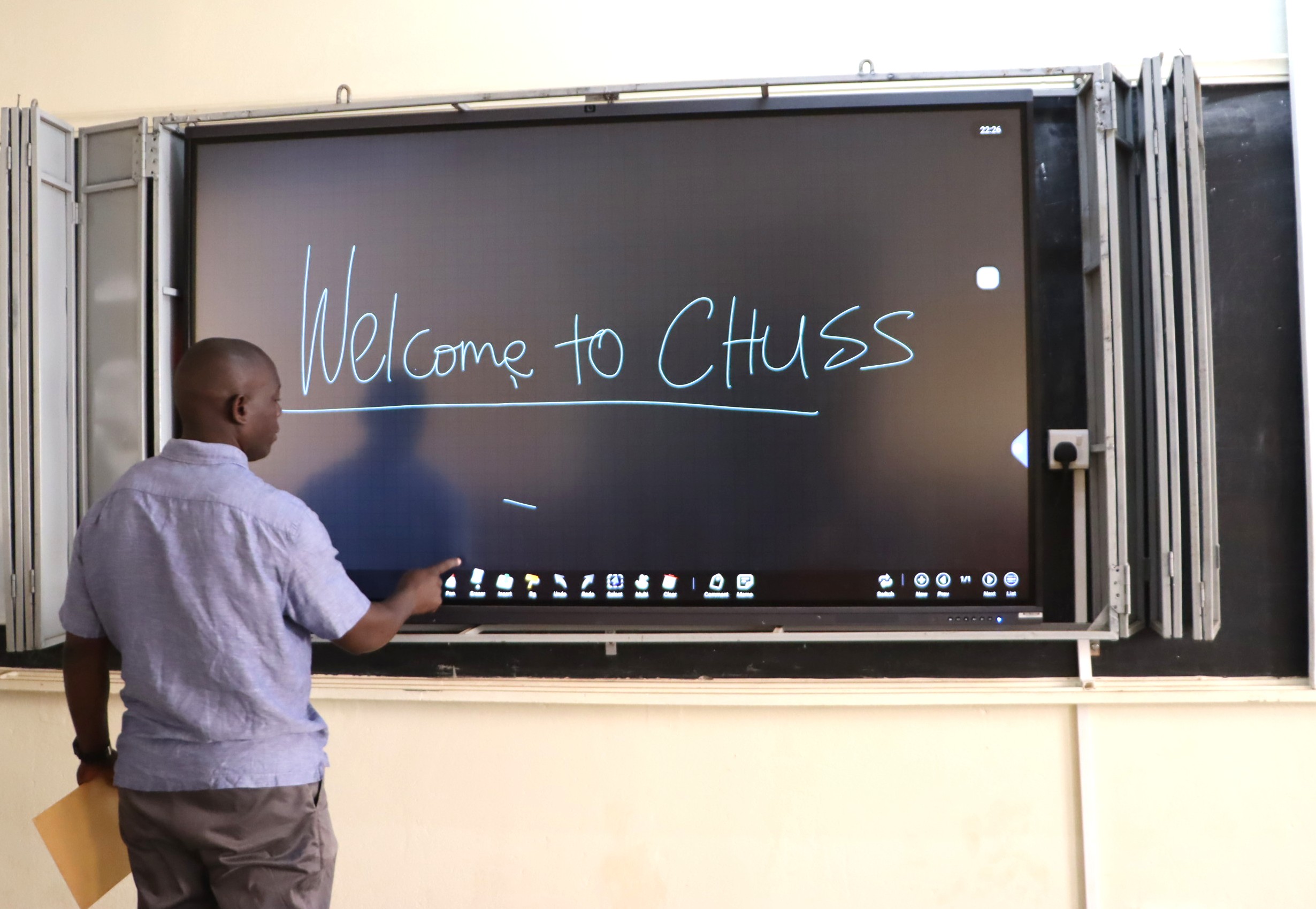
The College of Humanities and Social Sciences (CHUSS) has invested over UGX 100 million in the acquisition and installation of state-of-the-art interactive smart screens, marking a major step in strengthening digital teaching and learning at Makerere University.
Under the investment, 86-inch interactive 4K smart screens have been installed in major lecture rooms across the college’s schools, replacing traditional projectors and whiteboards. The upgrade is intended to modernise instructional delivery, enhance student engagement, and support blended and hybrid learning models.
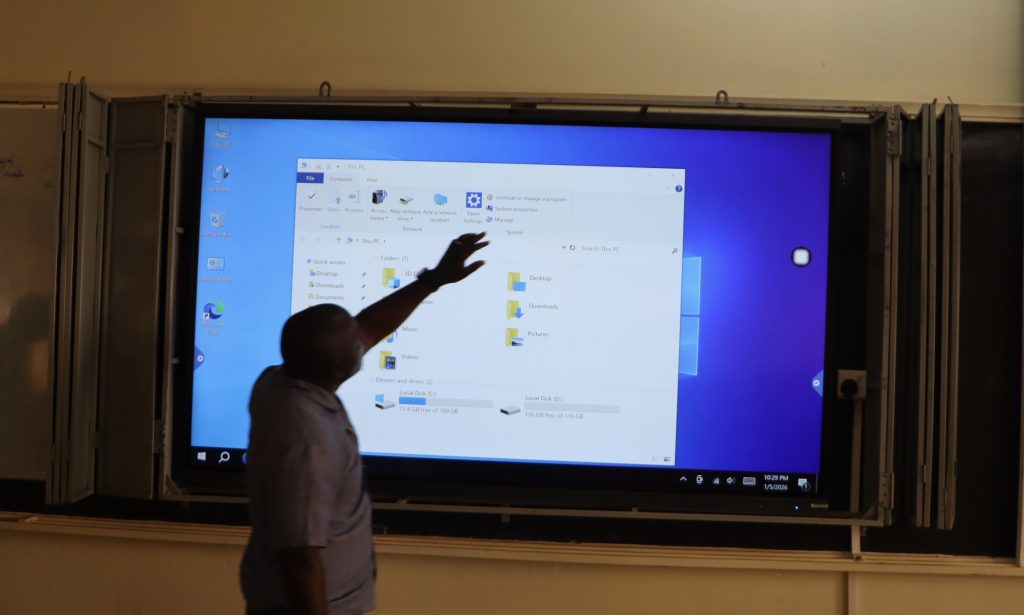
The touch-sensitive smart screens enable lecturers to write, draw, and annotate content directly on the display, while simultaneously integrating multimedia resources such as videos, presentations, and online materials. The screens support wireless screen casting from laptops, tablets, and smartphones, allowing for smooth, cable-free presentations and real-time sharing of students’ work during lectures and group discussions.
Designed to promote interactive and learner-centred pedagogy, the smart screens feature multi-touch capability that allows several users to interact with the board at the same time. This functionality supports collaborative learning, problem-solving exercises, and group presentations, making lessons more engaging and inclusive for students with diverse learning styles.
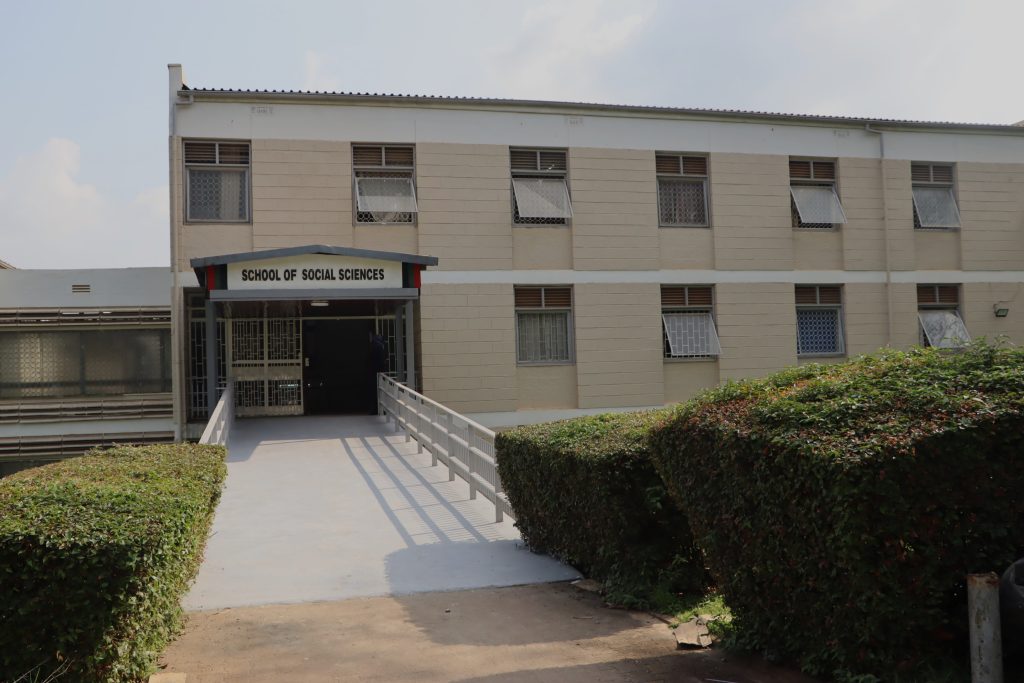
The boards are equipped with built-in cameras, microphones, and speakers, enabling seamless hybrid teaching through platforms such as Zoom, Microsoft Teams, and Google Meet. This allows lecturers to conduct virtual and physical classes simultaneously, record full lectures, and share them with students for later review, revision, or catch-up purposes.
Running on dual Android and Windows operating systems with full internet connectivity, the smart screens provide direct access to online academic resources, digital libraries, and learning management systems. Their AI-powered features further enhance lesson organisation, content clarity, and efficient, paper-free instruction, contributing to a more sustainable learning environment.
To ensure safety and prevent misuse, the smart screens are secured in fabricated metallic safety boxes installed in the lecture rooms.
Beyond digital infrastructure, CHUSS has also undertaken additional physical improvements. The Russian Lecture Room in the School of Languages, Literature and Communication has been furnished with new chairs, tables, and a projector screen, significantly enhancing its teaching environment.
The college has further improved staff working spaces, with the School of Psychology renovating office space and classrooms in Block A, while similar renovations have been carried out in the School of Social Sciences.
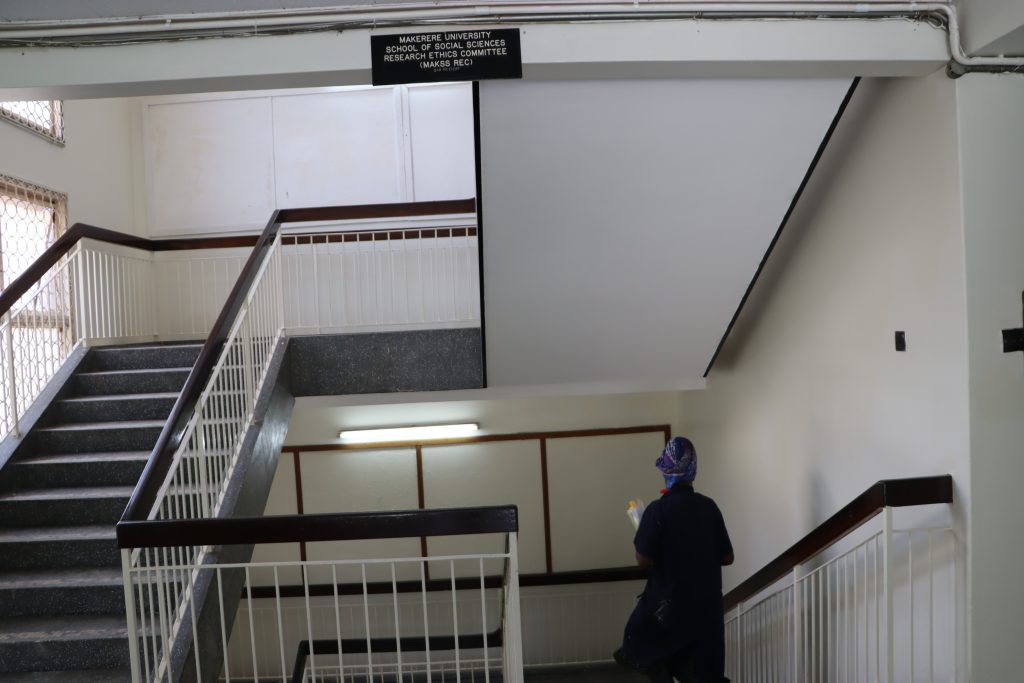
The infrastructural upgrades underscore CHUSS’ commitment to improving the quality of teaching, learning, and staff working conditions in line with Makerere University’s digital transformation agenda.
Trending
-

 General2 weeks ago
General2 weeks agoCall for Applications: Admission to Postgraduate Programmes 2026/2027
-

 Natural Sciences2 weeks ago
Natural Sciences2 weeks agoSimon Mungudit: Mak’s Best Performing Male Science Student & Rising Star in Petroleum Geoscience
-

 Agriculture & Environment1 week ago
Agriculture & Environment1 week agoFrom Adversity to Excellence: The Inspiring Journey of Makerere’s Best Science Student, Esther Ziribaggwa
-

 Health2 weeks ago
Health2 weeks agoCall For Applications: MakNCD Masters and PhD Training Opportunities
-

 General6 days ago
General6 days agoAptitude Exam (Paper 1) Results for the Mature Age Entry Scheme 2026/2027
